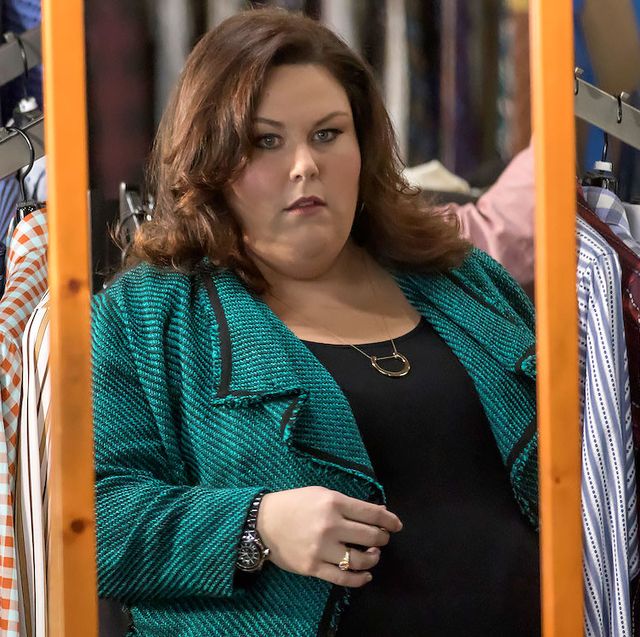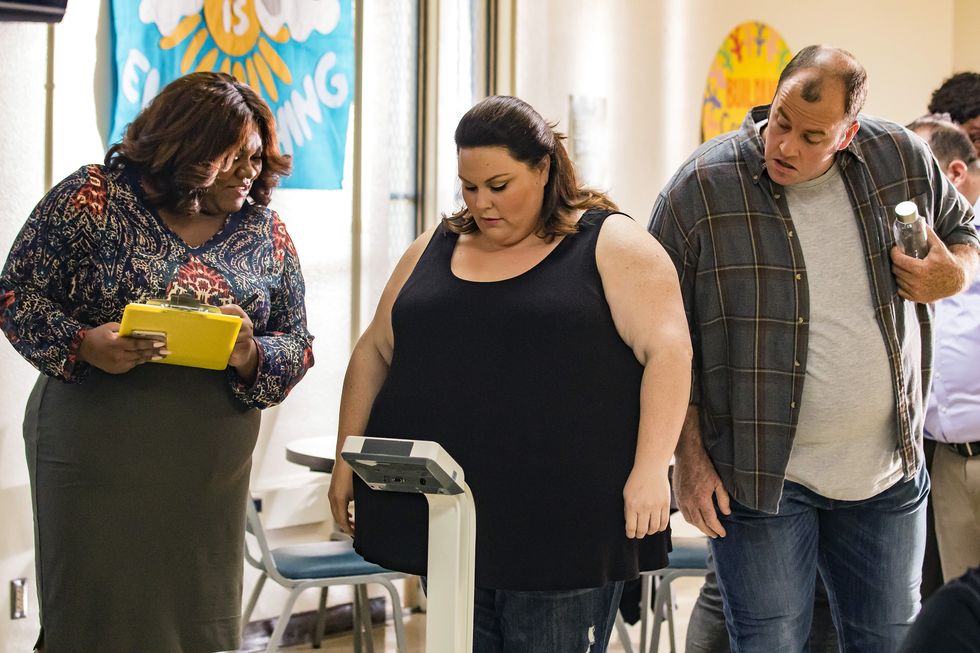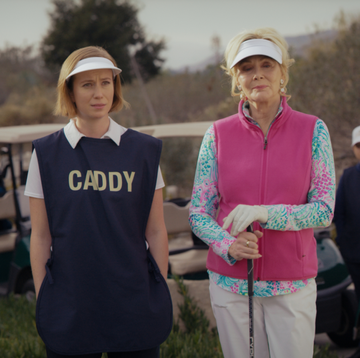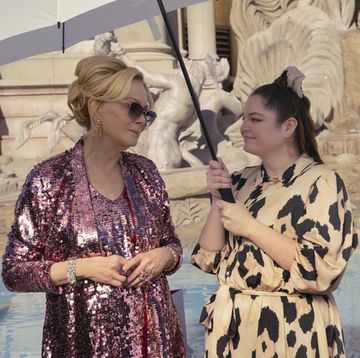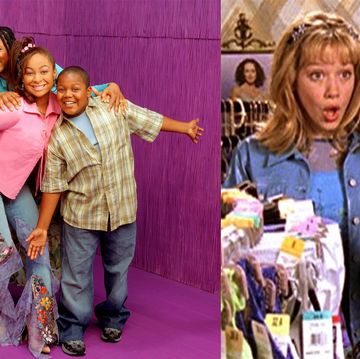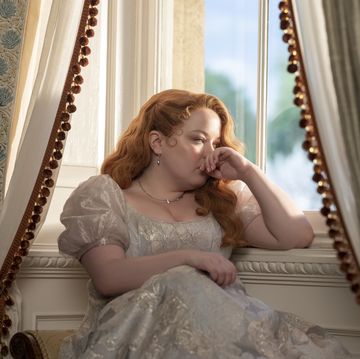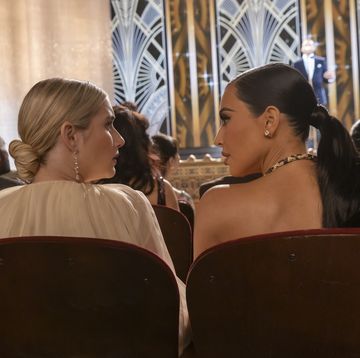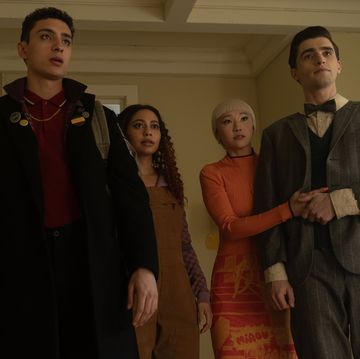Growing up fat, I rarely saw myself reflected on TV — and when I did, I was presented with a real shit-show of terrible stereotypes. There were three prevalent depictions of people of size: the gross monsters (Newman on Seinfeld), the skinny people in fat suits (Monica on Friends; a very special — and very terrible — Tyra episode), or the nonexistent fat person (um, everything else?). As a child, I sincerely believed I would magically become skinny when I entered adulthood because that was obviously the only non-awful way to exist in the world.
However, I did not miraculously become a size 4 upon entering adulthood, and TV didn’t change much either. Sure, we now have women like Amy Schumer, Lena Dunham, and Mindy Kaling being heralded as beyond brave for putting their “fat for TV” bodies on television. But in fact, they are smaller than the average American woman. Anything above a size 10 just doesn’t exist on screen, except very occasionally as a cautionary tale or punching bag.
That’s why I was so excited when I first heard Chrissy Metz would be playing a main character on NBC’s This Is Us — a show that, whether you think it’s soulful or smarmy, has gone on to strike a chord with viewers (it’s one of the biggest hits of the season). Unfortunately, the fat character turned out to be damn disappointing.
When I saw the show’s debut promotional poster, I was hopeful. Look! A fat woman! As a lead! On a major network television show! But then I saw the trailer, and my heart sank. It featured Kate, played by Metz, throwing away a cake with multiple "DO NOT EAT" signs on it and then stepping on a scale. It was a ridiculous caricature of a fat woman. Was she having a party and now she has no cake? Or did she buy that enormous cake for just herself but then put signs on it so she wouldn’t eat it? Neither of those things make sense! This is not how real people behave! The scene also made clear that her reason to exist in the series would simply be to lose weight. And my initial fears were right — as the show progressed, Kate’s singular obsession with getting skinny derailed everything good in her life. While her siblings, Kevin and Randall, explored much richer themes and narratives, Kate exercised fanatically and subsisted on lettuce. And when she wasn’t doing that, she was talking about it. We rarely see Kate work or have fun with her boyfriend or hang with her family without her weight being a central topic of conversation.
She hates herself, and she functions as a one-note character whose main goal is to make people cry about how sad they are for the fat girl every week — and it works! I’ve cried for her so much that I’m actually starting to get angry at myself for it. But when you think about it even a little, it’s not that hard to make people cry when you’re manipulating their emotions with simplistic caricatures of troubled people. How do I not shed a tear for the sad fat girl trying so hard to lose weight?
The problem with my tears is that they’re superficial; this feeling of pity doesn’t bring me closer to understanding Kate or other fat people. Pity is very different from empathy — pity makes you feel sorry for an “othered” person, and empathy puts you in their shoes. This is an important distinction, because pity removes you from the person, it makes you see them as less than, as someone pathetic who deserves your generous sympathy, rather than a human being with struggles similar to your own. But then, people like feeling bad for other people: If a fat person is unhappy with themselves and constantly struggling, maybe your life isn’t so terrible by comparison. (And, if the character loses weight, well then, even better! Viewers can believe they, too, are capable of incredible transformation.)
Maybe such a one-note portrayal of a fat woman wouldn’t be such a huge problem if there were more varied people of size on TV. But television is a hostile place for fat people, and fat women in particular. Even progressive, inclusive shows that reflect the diverse America I see when I step outside can be shitty to fat people. Important, thoughtful programming like Jessica Jones and Master of None both feature (uninteresting, dumb) fat jokes. Within minutes of Jessica Jones's first episode, the titular character comments in disgust on a woman who stops exercising to eat a doughnut. On Master of None, the main character and his girlfriend joke about the most polite thing to call a fat person. And on the rare occasion when a show treats its fat character as simply a person living her life, like Gabourey Sidibe’s love scene on Empire, viewers might attack the actress for having the audacity to be a human being with wants and desires that aren’t all about how insecure she feels in her skin. Guess what, everyone: Fat people fuck! And they go to parties, and they write dissertations, and they exercise for reasons other than losing weight. I know! It’s nuts!
I can think of only two recent exceptions to the (unspoken but fully enacted) Fat People on TV Rule: (1) Nicole Byer on MTV’s (unfortunately canceled) Loosely Exactly Nicole, a hilarious show about a woman who just happens to be fat. And (2) Louie Anderson as Christine Baskets on Baskets. Anderson's portrayal of the Basket family's much put-upon matriarch rings true on several levels. Although Christine’s weight is mentioned at one point — her mom harps on her about it — it’s just a part of her character’s story. It’s not her entire character.
It's as if the only way we can appreciate a fat person on TV is if they are a living, breathing “before photo.” Someone who is repentant in their body, who knows they must get skinny to atone for their sins of simply existing as a fat person in the world. That seems to be what’s happening with Kate’s character. In Metz’s contract for the This Is Us, weight loss is mandatory. "In our contract, it did state that that would be a part of it, to lose the weight in the trajectory of the character as she comes to find herself," she told TVLine. "That was a win-win for me. Because it’s one thing to try to do it on your own. But as human beings, it’s an ego thing: We’re more likely to do something for someone else."
First, it should be noted that Metz is an extremely talented actress who plays the shit out of whatever she’s given. And I have serious empathy for actresses who are trying to lose weight in general, and for those who actually do. As just a normal fat woman, the pressure to be thin is nearly unbearable; I can’t even begin to understand how hard that would be as a person who makes her living on camera. Losing weight will mean more parts, less typecasting, and being treated with less faux concern (“I just want you to be healthy!”) and real contempt by the public. And I get why showrunners and executives create these roles — a redemptive weight loss narrative is the ambrosia of the people.
It just bums me out that the portrayal of fat people on television is almost always this one very specific weight-loss narrative, especially when most fat people will never be skinny. The odds of losing weight and keeping it off are astronomically low, but hey. If you’re able to do it, you’ll be rewarded with finally seeing yourself reflected in culture in a non-humiliating way. If not, too bad, so sad. You failed, and you get nothing, with the exception of characters trying really hard not to look like you.
And that’s a problem because representation matters. It’s important to see yourself mirrored in the media you consume — and it’s important for people who don’t look like you to see it too. Representation creates understanding and empathy. It allows us to see people who don’t look like us as humans who deserve respect. It allows little kids to feel seen, and have a sense of worth and importance. How revolutionary would it be if it turned out Kate didn’t need to lose weight to “find herself”? What if she found out she’s a fat person who is deserving of good things, just the way she is? That’s a role model I wish I would’ve had growing up.
Follow Laura on Twitter.
